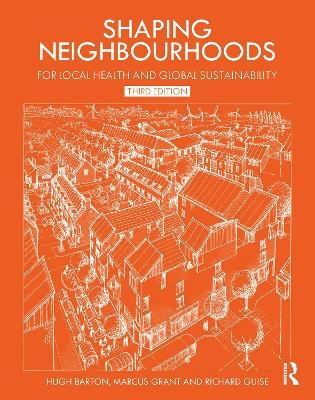
Shaping Neighbourhoods
Routledge (Verlag)
978-0-367-33691-2 (ISBN)
Shaping Neighbourhoods is unique in combining all aspects of the spatial planning of neighbourhoods and towns whilst emphasising positive outcomes for people’s health and global sustainability. This new edition retains the combination of radicalism, evidence-based advice and pragmatism that made earlier editions so popular.
This updated edition strengthens guidance in relation to climate change and biodiversity, tackling crises of population health that are pushing up health-care budgets, but have elements of their origins in poor place spatial planning – such as isolation, lack of everyday physical activity, and respiratory problems. It is underpinned by new research into how people use their localities, and the best way to achieve inclusive, healthy, low-carbon settlements.
The guide can assist with:
• Understanding the principles for planning healthy and sustainable neighbourhoods and towns
• Planning collaborative and inclusive processes for multi-sectoral working
• Developing know-how and skills in matching local need with urban form
• Discovering new ways to integrate development with natural systems
• Designing places with character and recognising good urban form
Whether you are a student faced with a local planning project; a public health professional, planner, urban designer or developer involved in new development or regeneration; a council concerned with promoting healthy and sustainable environments; or a community group wanting to improve your neighbourhood – you will find help here.
Hugh Barton is well known for his long history of innovation for healthier and more sustainable places. He is an urban planner and Emeritus Professor of planning, health and sustainability at the University of the West of England, Bristol. In the early 1980s, he co-founded the Urban Centre for Appropriate Technology, now the Centre for Sustainable Energy. Later he was Director of the WHO Collaborating Centre for Healthy Urban Environments, working with cities across Europe. He is also a prolific author. Early publications include Sustainable Settlements and Sustainable Communities. In 2000, the WHO commissioned him to write the ground-breaking Healthy Urban Planning, more recently he has published The Routledge Handbook for Health and Well-being and City of Well-being: A Radical Guide to Planning. In ‘retirement’ Hugh is a trustee for environmental charities, composes music, directs choirs, climbs mountains and enjoys his extended family. Marcus Grant has a background in ecological systems and urbanism, and is an urban designer and landscape architect. In practice since 1986, he worked on rural and urban projects for a range of clients. Following almost twenty years at the World Health Organisation’s Collaborating Centre for Healthy Cities, culminating as deputy director and Associate Professor, he went on to found Cities & Health, a Routledge journal. He specialises in spatial frameworks and neighbourhood interventions to support healthier lives, planetary health and reduce health inequalities. He has worked as expert advisor with the WHO and UN-Habitat, with communities and local authorities across Europe and on the inaugural public health NIHR scientific funding panel. Marcus is a Fellow of the Faculty of Public Health by distinction. Richard Guise is an architect and town planner, principal of his urban design consultancy Context4D, based in Bristol. He is known for his evocative and perceptive drawings. Formerly, Course Leader of the MA Urban Design programme at the University of the West of England, his career fuses professional and academic aspects of urban design. Richard is co-author of Characterising Neighbourhoods, Sustainable Settlements and two volumes of Streets for All for English Heritage. He now works mainly for local authorities, producing design guides, urban character reports, urban design frameworks and training. Richard is an Academician of the Academy of Urbanism, a Fellow of the Royal Society of Arts and a member of the Design West design review panel.
Chapter 1. Orientation and Principles
Chapter 2. A Neighbourhood Planning Process
Chapter 3. Providing for Local Need
Chapter 4. Working With Natural Systems
Chapter 5. Neighbourhood Strategy
Chapter 6. Neighbourhood Design and Placemaking
| Erscheinungsdatum | 01.07.2021 |
|---|---|
| Verlagsort | London |
| Sprache | englisch |
| Maße | 219 x 276 mm |
| Gewicht | 453 g |
| Themenwelt | Studium ► Querschnittsbereiche ► Prävention / Gesundheitsförderung |
| Naturwissenschaften ► Geowissenschaften ► Geografie / Kartografie | |
| Sozialwissenschaften ► Soziologie | |
| ISBN-10 | 0-367-33691-X / 036733691X |
| ISBN-13 | 978-0-367-33691-2 / 9780367336912 |
| Zustand | Neuware |
| Informationen gemäß Produktsicherheitsverordnung (GPSR) | |
| Haben Sie eine Frage zum Produkt? |
aus dem Bereich


